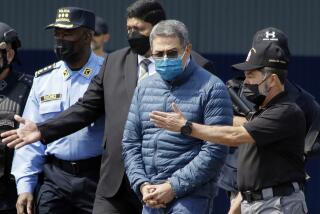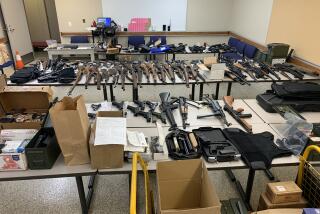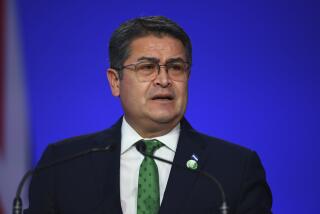Hasenfus Receives 30-Year Sentence : American Gets Maximum Penalty After Nicaragua Terrorism Conviction
- Share via
MANAGUA, Nicaragua — American prisoner Eugene Hasenfus, shot out of the sky on a supply mission to U.S.-backed rebels in Nicaragua, was convicted Saturday of terrorism and related charges and sentenced to the maximum penalty of 30 years in prison.
Hasenfus, 45, from Marinette, Wis., sat stoically in the People’s Anti-Somocista Tribunal as the lengthy verdict was read first in Spanish and then in English. When informed by Tribunal President Reynaldo Monterrey that he had to make an immediate decision on whether to appeal the verdict, Hasenfus said he would appeal.
Hasenfus’ wife, Sally, also impassive in the hot, crowded courtroom, later made an emotional plea to President Daniel Ortega for mercy.
Ortega has left open the possibility of a pardon for Hasenfus, but government officials say that decision has not been made. Diplomats and officials of the leftist Sandinista government said they do not expect a pardon to be granted soon.
Victim of Policy
In a speech at an air force promotion ceremony Saturday, Defense Minister Humberto Ortega portrayed Hasenfus as a victim of U.S. policy and referred to him as the “father of a family.” Ortega said the tribunal was condemning “not the citizen Hasenfus, but the irrational, unjust policy of the current U.S. Administration.”
Hasenfus, a former U.S. Marine, was the cargo handler and sole survivor on an American-piloted C-123 cargo plane shot down by a Sandinista soldier Oct. 5 in southern Nicaragua. Pilots William J. Cooper and Wallace B. Sawyer died in the crash along with a Nicaraguan radio operator.
The plane was carrying rifles, grenades, ammunition and other military supplies to the right-wing Nicaraguan guerrillas, called contras, who are trying to overthrow the Marxist-led Sandinistas.
The tribunal convicted Hasenfus on charges of terrorism and illicit association for criminal purposes and on two counts of violating a law on public order and security. The public security charge carries the 30-year sentence, which is the maximum penalty under Nicaraguan law. The sentences are to run concurrently.
Monterrey, the tribunal president, said the conviction was based on Hasenfus’ written and oral confessions, the testimony of soldiers who shot down the plane and captured him, an examination of the crash site, and arms and documents from the airplane.
Incriminating Documents
Hasenfus and the two pilots carried scores of incriminating documents, including identification cards, business cards and flight logs that provided a blueprint for the U.S.-supported contra supply network through U.S.-allied El Salvador and Honduras.
Hasenfus admitted to the tribunal and to U.S. journalists that he made a total of 10 supply flights out of Ilopango Military Air Base in El Salvador and Aguacate Air Base in Honduras to supply contra forces in Nicaragua.
In reading the decision, Monterrey said the tribunal was convinced that Hasenfus worked for the CIA in the supply missions.
Backed Off Link to CIA
In his written confession, Hasenfus said that two Cuban-Americans who ran the supply operation out of El Salvador “worked for the CIA” and that one of them, Max Gomez, was a personal friend of Vice President George Bush “through the CIA.” He told journalists that he believed that he was working for the CIA.
But in court Hasenfus backed off that statement, saying the CIA connection was hearsay that he could not prove.
The U.S. government has denied any connection with the supply flights, saying they were funded primarily by private American supporters. However, telephone logs found in contra safe houses in San Salvador showed calls to a member of the National Security Council staff, Lt. Col. Oliver L. North. Both Bush and Edwin G. Corr, the U.S. Ambassador to El Salvador, admitted to meeting with Max Gomez, whose real name is Felix Rodriguez.
Reacting to the conviction, the U.S. Embassy in Managua said, “The Nicaraguan government orchestrated a show trial at their People’s Anti-Somocista Tribunal to convict Hasenfus with a maximum of publicity. Mr. Hasenfus’ conviction, thus, comes as little surprise.”
Rights Violations Charged
The embassy charged that the Nicaraguan government violated many of Hasenfus’ rights of due process by denying him adequate pretrial access to his Nicaraguan lawyer and preventing him from meeting with former U.S. Atty. Gen. Griffin B. Bell, who was representing the family. They charged that the procedural decisions during the trial were biased in favor of the prosecution and that Hasenfus should have been tried in a regular court rather than by the tribunal.
The tribunal was established under an emergency decree to try political cases, originally defendants accused of being members of the National Guard under dictator Anastasio Somoza, whom the Sandinistas ousted in 1979.
Now the tribunal hears cases against accused contras or those accused of aiding them. It has a 90% conviction rate, according to government figures.
Bell, who kept a high profile criticizing the tribunal in the early days of the trial, was not in the country for the verdict. In denying him access to Hasenfus, the government said he was not eligible to practice law in Nicaragua.
Several hundred journalists and spectators watched the reading of the verdict, some standing on chairs and others peeking in the windows from outside, where vendors sold ice cream and homemade candy.
Defense Challenge
In its decision, the tribunal discounted arguments by defense attorney Enrique Sotelo Borgen that Hasenfus should not have been tried in the special courts because he was a foreigner. Sotelo had argued that his client was guilty only of transporting arms and, under the terrorism charge, should be sentenced to no more than two years in jail.
At a press conference after her husband was led back to jail, Sally Hasenfus fought back tears as she read a statement asking for a pardon.
“Gene realizes that in accepting this job he has made a terrible mistake--a mistake for which we have all paid dearly,” she said, her voice breaking.
“I have only gratitude and love in my heart for the people of Nicaragua who have treated me with kindness and courtesy rather than the hostility that the circumstances could have warranted,” she said.
She appealed for mercy from Ortega and his government, “who have my husband’s fate as well as my future and the future of our children in their hands,” and she added, “The hearts of my children as well as my own are locked in your prison.”
Pardon Not Likely Soon
Government officials said in recent interviews that a pardon may be granted as a humane gesture but that it is not likely to be soon. They said the decision would be made by Ortega and other members of the Sandinista Front National Directorate.
“We are not in a hurry to let him go. He is not a problem for us,” said Foreign Ministry spokeswoman Angela Saballos. “He broke Nicaraguan laws and he is not a hostage, but a prisoner. The problem is for the United States, who sent him.
“If Hasenfus is a prisoner here in Nicaragua, it is because the U.S. government decided on this war in Nicaragua,” Saballos continued. “If this situation didn’t exist, Hasenfus would still be in Marinette, and his other two friends would be alive.”
One government minister expressed opposition to a release, saying it would not be fair to the families of soldiers killed in the war. Another minister said Hasenfus should be held until the government needs a bargaining chip.
“For example, when the Senate votes again on contra aid,” he said.
Several Nicaraguans interviewed said Hasenfus should serve out his sentence.
“He should pass his sentence here in Nicaragua. He violated the law,” said Sofia Hernandez, 76. “If a Nicaraguan fell into the hands of the contras, they would cut off his head. He is well fed.”
“In my opinion, they should send him to a work farm,” said Gloria Ortega, 38, a teacher. “The worst punishment we could give him would be to put him to work for the revolution.”
More to Read
Sign up for Essential California
The most important California stories and recommendations in your inbox every morning.
You may occasionally receive promotional content from the Los Angeles Times.










